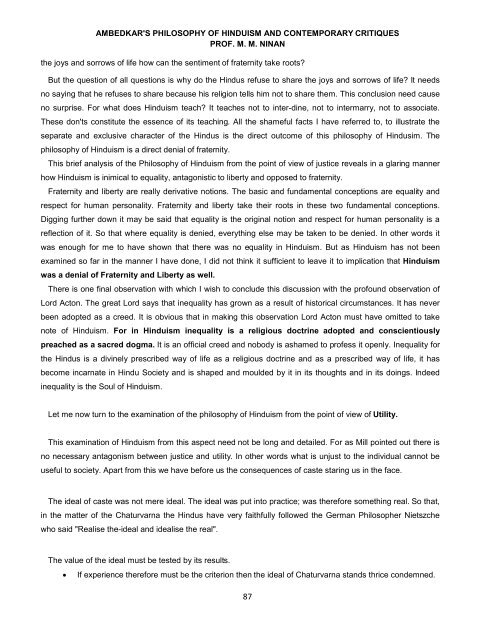Ambedkar-Philosophy of Hinduism
Create successful ePaper yourself
Turn your PDF publications into a flip-book with our unique Google optimized e-Paper software.
AMBEDKAR'S PHILOSOPHY OF HINDUISM AND CONTEMPORARY CRITIQUES<br />
PROF. M. M. NINAN<br />
the joys and sorrows <strong>of</strong> life how can the sentiment <strong>of</strong> fraternity take roots?<br />
But the question <strong>of</strong> all questions is why do the Hindus refuse to share the joys and sorrows <strong>of</strong> life? It needs<br />
no saying that he refuses to share because his religion tells him not to share them. This conclusion need cause<br />
no surprise. For what does <strong>Hinduism</strong> teach? It teaches not to inter-dine, not to intermarry, not to associate.<br />
These don'ts constitute the essence <strong>of</strong> its teaching. All the shameful facts I have referred to, to illustrate the<br />
separate and exclusive character <strong>of</strong> the Hindus is the direct outcome <strong>of</strong> this philosophy <strong>of</strong> Hindusim. The<br />
philosophy <strong>of</strong> <strong>Hinduism</strong> is a direct denial <strong>of</strong> fraternity.<br />
This brief analysis <strong>of</strong> the <strong>Philosophy</strong> <strong>of</strong> <strong>Hinduism</strong> from the point <strong>of</strong> view <strong>of</strong> justice reveals in a glaring manner<br />
how <strong>Hinduism</strong> is inimical to equality, antagonistic to liberty and opposed to fraternity.<br />
Fraternity and liberty are really derivative notions. The basic and fundamental conceptions are equality and<br />
respect for human personality. Fraternity and liberty take their roots in these two fundamental conceptions.<br />
Digging further down it may be said that equality is the original notion and respect for human personality is a<br />
reflection <strong>of</strong> it. So that where equality is denied, everything else may be taken to be denied. In other words it<br />
was enough for me to have shown that there was no equality in <strong>Hinduism</strong>. But as <strong>Hinduism</strong> has not been<br />
examined so far in the manner I have done, I did not think it sufficient to leave it to implication that <strong>Hinduism</strong><br />
was a denial <strong>of</strong> Fraternity and Liberty as well.<br />
There is one final observation with which I wish to conclude this discussion with the pr<strong>of</strong>ound observation <strong>of</strong><br />
Lord Acton. The great Lord says that inequality has grown as a result <strong>of</strong> historical circumstances. It has never<br />
been adopted as a creed. It is obvious that in making this observation Lord Acton must have omitted to take<br />
note <strong>of</strong> <strong>Hinduism</strong>. For in <strong>Hinduism</strong> inequality is a religious doctrine adopted and conscientiously<br />
preached as a sacred dogma. It is an <strong>of</strong>ficial creed and nobody is ashamed to pr<strong>of</strong>ess it openly. Inequality for<br />
the Hindus is a divinely prescribed way <strong>of</strong> life as a religious doctrine and as a prescribed way <strong>of</strong> life, it has<br />
become incarnate in Hindu Society and is shaped and moulded by it in its thoughts and in its doings. Indeed<br />
inequality is the Soul <strong>of</strong> <strong>Hinduism</strong>.<br />
Let me now turn to the examination <strong>of</strong> the philosophy <strong>of</strong> <strong>Hinduism</strong> from the point <strong>of</strong> view <strong>of</strong> Utility.<br />
This examination <strong>of</strong> <strong>Hinduism</strong> from this aspect need not be long and detailed. For as Mill pointed out there is<br />
no necessary antagonism between justice and utility. In other words what is unjust to the individual cannot be<br />
useful to society. Apart from this we have before us the consequences <strong>of</strong> caste staring us in the face.<br />
The ideal <strong>of</strong> caste was not mere ideal. The ideal was put into practice; was therefore something real. So that,<br />
in the matter <strong>of</strong> the Chaturvarna the Hindus have very faithfully followed the German Philosopher Nietszche<br />
who said "Realise the-ideal and idealise the real".<br />
The value <strong>of</strong> the ideal must be tested by its results.<br />
• If experience therefore must be the criterion then the ideal <strong>of</strong> Chaturvarna stands thrice condemned.<br />
87


















